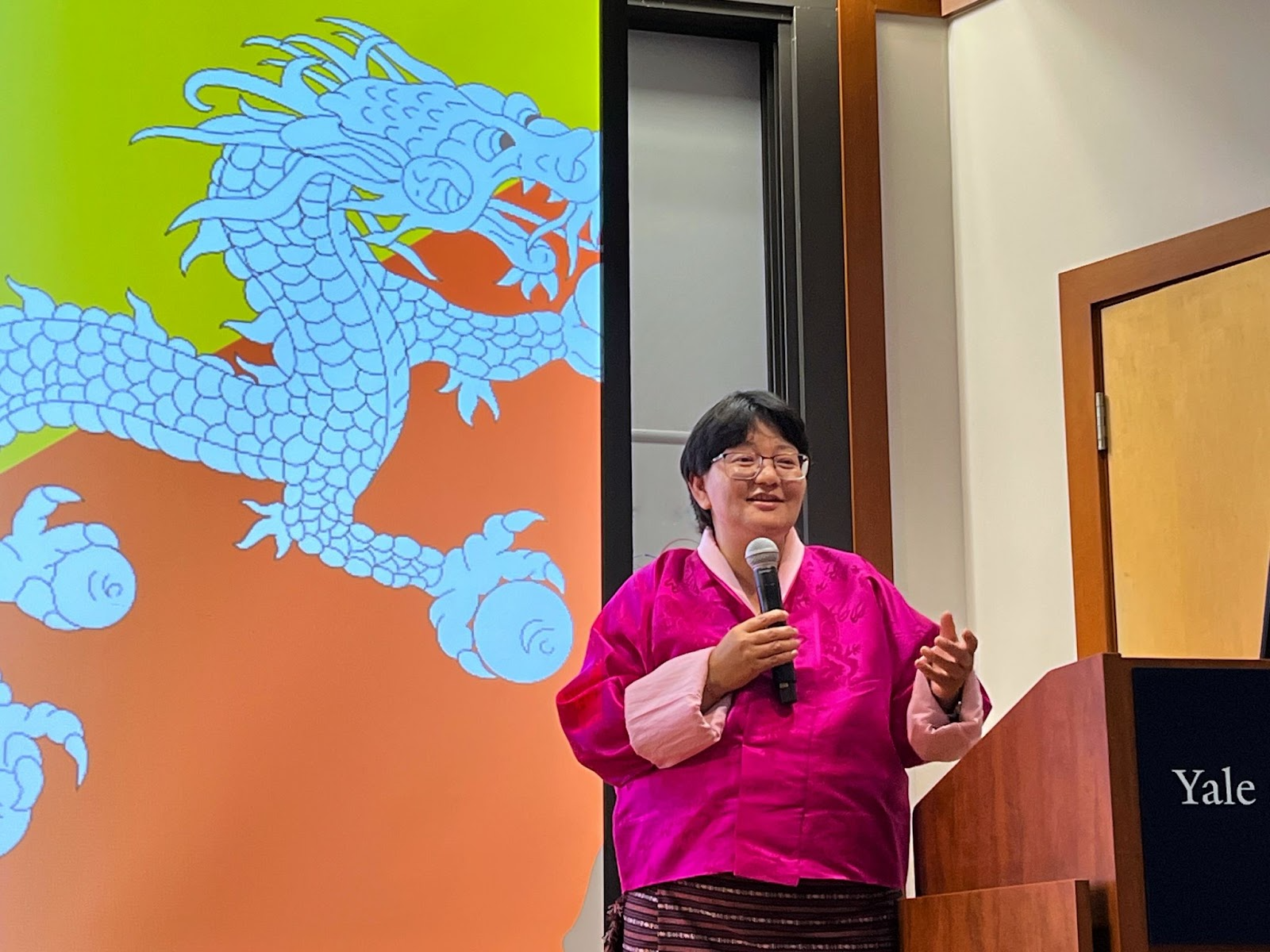Health minister of Bhutan speaks at the School of Public Health
Dechen Wangmo, health minister of Bhutan and School of Public Health alumna, describes institutional collaboration on public health in Bhutan.

William J Zhang, Contributing Photographer
Dechen Wangmo SPH ’07, Bhutan’s minister for health, delivered a lecture on Thursday at the School of Public Health on Bhutan’s COVID-19 response.
Wangmo, the only female minister in Bhutan’s cabinet, was previously the president of the World Health Assembly, a position Bhutan had assumed for the first time since it became a member of the WHO in 1982. As a guest lecturer for the Yale Institute for Global Health’s Global Health Seminar, Wangmo described the close relationship between Bhutan and Yale and Bhutan’s efficient public health system and pandemic response.
“We managed to vaccinate 94 percent of our population in four days,” Wangmo said.
Bhutan’s national COVID-19 response strategy revolved around four central ideas: prevention, containment, protection and routine surveillance.
Speaking about behavior change under the response strategy, Wangmo recounted that, “during COVID, suddenly we saw a huge impact [from the effects of handwashing].”
She said that the observation led her to realize the importance of consistent messaging around disease prevention, especially for “small, resource-challenged countries.”
“In Bhutan, wearing a mask was not a political statement, washing our hands was not a political statement — it was public health,” Wangmo said.
Under the containment strategy, Bhutan sought to control the pandemic and break the chain of disease transmission. Faced with a vast shortage of nurses, Wangmo described how the country recruited and deployed second- and final-year health professional students to help combat the virus.
Furthermore, Bhutan had only one doctor equipped to work in an intensive care unit. But according to Wangmo, Bhutan’s relatively small population of just over 785,000 was also a collective strength toward the country’s response agility.
“We reached out to all of our periphery health facilities for an efficient referral system, so anyone who required ventilative care would be moved to the capital,” Wangmo explained.“We were able to do this because we were a small population.”
Thritha Anand SPH ’25 is studying environmental health sciences with the global health concentration at the School of Public Health.
Anand was inspired to apply to Yale due to the University’s strong focus on global health.
“[The lecture] gave me a perspective on solidarity and how in small countries it is easier to develop that than in more politically-unstable countries,” Anand said. “I really appreciated that perspective that was not U.S.-centric because public health is a global issue; it is not restricted to one country, and it is not restricted to the United States.”
School of Public Health faculty — including Kaveh Khoshnood, an epidemiology professor, and Mary Alice Lee, a health policy professor — have a relationship with Bhutan that spans a decade.
Khoshnood iswil also the co-director of the Global Health Ethics Program. In an interview with the News, he explained that Yale places emphasis on forming an “equitable partnership” that is “not just one-directional.”
For Khoshnood, a long-standing partnership with a collaborating country establishes the necessary trust for the collaborator to express their priorities.
“If we are going to conduct a research project, it should be beneficial on both sides,” Khoshnood said. “One of the silver linings from this terrible pandemic is that global health gets much more attention … We need to care for the health of populations around the globe.”
Michael Skonieczny, deputy director of the Yale Institute for Global Health, told the News that Wangmo’s lecture can inspire students to learn about and make an impact on global health.
Both Skonieczny and Wangmo look forward to further partnership opportunities.
“Since the Minister (Dechen Wangmo) is an alumna of the School, it also gives the students an example of what they can become, and the impact they can have in global health,” wrote Skonieczny.
Wangmo outlined some goals for Bhutan’s road ahead regarding health security, social security and economic security. She is working to bolster Bhutan’s health system and workforce and to foster a resilient public service system.
Currently, Bhutan does not have a medical school, and many students attend medical schools in India, Sri Lanka and Bangladesh. However, these countries have limited seats for Bhutanese students.
Wangmo sees American schools as another opportunity for these students.
“We need to invest, as a country, in the capacity and the competency of our own people,” Wangmo said. “That is why we want to work with the Yale School of Public Health.”
Wangmo was sworn in as minister for health in 2018.







